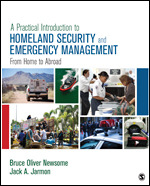A Practical Introduction to Homeland Security and Emergency Management
From Home to Abroad
- Bruce Oliver Newsome - University of California, Berkeley, USA
- Jack A. Jarmon - University of Pennsylvania, USA, Seton Hall University, USA, Rutgers University, USA
Criminology & Criminal Justice (General) | International Security & Conflict | Terrorism
- Jason Levy, Virginia Commonwealth University
A Practical Introduction to Homeland Security and Emergency Management: From Home to Abroad offers a comprehensive overview of the homeland security field, examining topics such as counter-terrorism, border and infrastructure security, and emergency management. Authors Bruce Newsome and Jack Jarmon take a holistic look at the issues and risks, their solutions, controls, and countermeasures, and their political and policy implications. They also demonstrate through cases and vignettes how various authorities, policymakers and practitioners seek to improve homeland security. The authors evaluate the current practices and policies of homeland security and emergency management and provide readers with the analytical framework and skills necessary to improve these practices and policies.
“A Practical Introduction to Homeland Security and Emergency Management: From Home to Abroad is as an extremely versatile, useful, and timely addition to the homeland security field. It serves as an excellent reference tool for an introductory homeland security and emergency management course, and it can be used as a valuable and comprehensive resource for multiple majors and courses. This text is perhaps the most lucid, articulate, well-organized, and in-depth examination of homeland security and emergency management that I have the opportunity to review. Students and practitioners will equally benefit by the attention to detail, insights, clarity, and level of professional application. It is clear that Newsome and Jarmon invested a tremendous amount of energy, scholarship, and expertise into the text.”
“A Practical Introduction to Homeland Security and Emergency Management: From Home to Abroad provides a fair and balanced look at both homeland security and emergency management. Unfortunately, there have been books with similar titles on the market that have been one-sided based on the background of the author. This book, however, provides an objective look at both areas and more important, a look into how the two integrate. Well done.”


